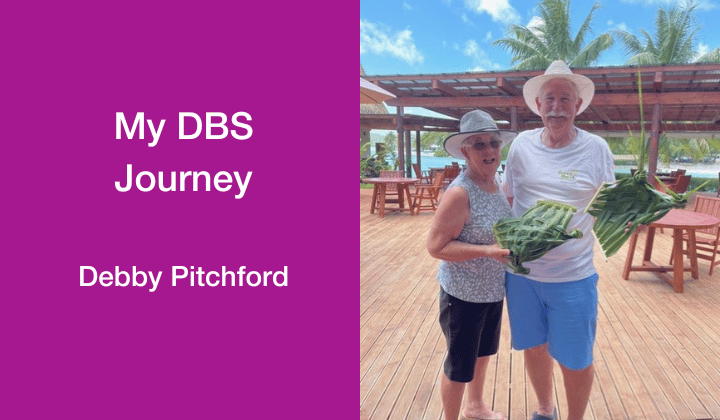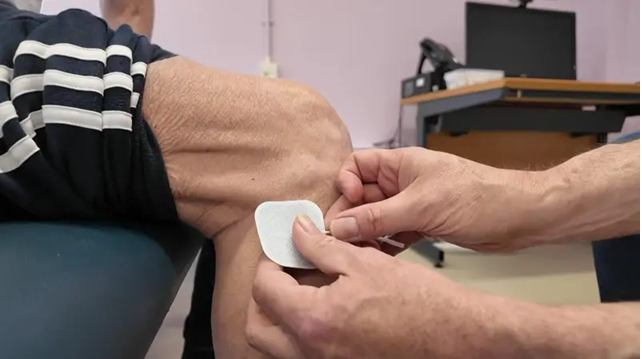My [Parkinson’s] Life – Sandra Elms

Active and Healthy
5th April 2021
Virtual Dance for Parkinson’s classes in Mandarin
5th April 2021My [Parkinson’s] Life – Sandra Elms
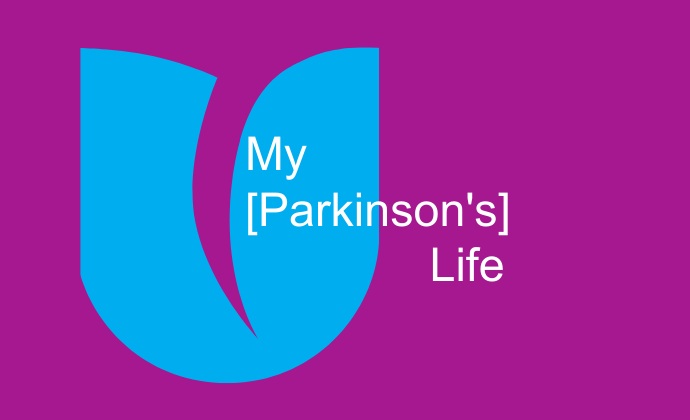
My [Parkinson’s] Life – Sandra Elms
NEVER QUIT, EVEN IN DIFFICULT TIMES… SANDRA ELMS
Sandra Elms was born in England but has spent several periods of her life in Australia – firstly as a child growing up in Perth with her parents and sister, then as an 18-year-old travelling around with a friend for three years.
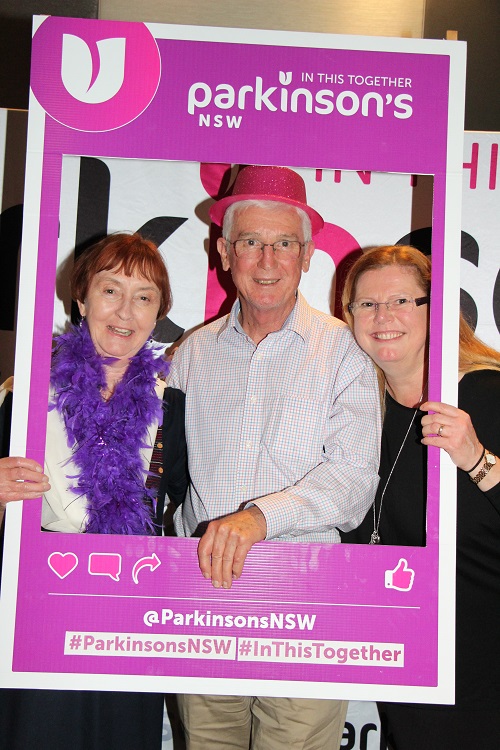
Sandra (left), with fellow Newcastle Support Group participant Lawrie and Jo-Anne Reeves Parkinson’s NSW CEO
Travelling to other countries was always something that interested her and when she married, she moved with her husband to the Sudan.
“We had three years working at the University of Khartoum, which was amazing,” Sandra explained. “It was a bit of a time warp, with colonial things like lawn tennis courts and tiffin – although it was never a British colony; it was governed jointly by Egypt and Britain.”
When their time was up the couple travelled overland back to England, travelling through Pakistan, across the Khyber Pass into Afghanistan and through what was still thought of as Persia (Iran) and into Europe and then home.
“We never thought of ourselves as tourists, but as travellers,” said Sandra. “When I look back now, I think ‘wow, that was an incredible trip’ but you could do it back then.”
Back in England Sandra decided it was time to have children and they had two girls and twin boys, but unfortunately the marriage broke up.
“I decided to bring my four children to Australia to start a new life,” she explained.
“Being a single parent was very, very hard, but we were a very cohesive group. The girls and boys always helped each other and somehow we managed and they all went to university.
“We kept in contact with the children’s father and the children have done incredibly well and they have interesting and excellent careers.
“I WAS A TEACHER IN LONDON AFTER A CAREER IN MEDICAL RESEARCH AND I CONTINUED TO TEACH IN SYDNEY.”
“I loved teaching and eventually became the Year Coordinator at an independent girls’ school. I also ran the social justice group and have always focused on helping other people. We have so much compared to others in the world.”
“I stopped teaching in 2008 and went to Southern India for four months’ voluntary work at a small school and women’s centre in Kerala. I always intended to go back for a longer time.”
On Sandra’s return, she moved to Newcastle to be closer to one of her daughters and it was in Newcastle in 2012 that she was diagnosed with Parkinson’s.
“I had a tremor, but I thought it was going to be a thyroid problem as my mother and my sister had thyroid issues,” she recalled.
“I knew Parkinson’s was the other possibility, but I didn’t really think it was going to be that, so it was a bit of a shock. The thing with Parkinson’s is that there is no one test, it’s a slow process of elimination.
“I saw one rather unpleasant neurologist who bluntly told me that in ten years I’d be in a wheelchair when I asked what my prognosis was. I didn’t go back to him! It’s so important you find someone you’re comfortable with that you trust, and a good GP,” said Sandra.
“Because I taught science, and was a medical researcher, I’ve researched a lot and read a lot and I more or less decide on what medications I will take, with my neurologist.
“I ALSO KNOW THE IMPORTANCE OF EXERCISE IN SLOWING THE PROGRESS AND MANAGING MY MOOD.”
“And I am grateful that it’s something which can be treated, it’s not something worse.”
Sadly, Sandra has personal experience of a more shocking diagnosis. Just a year after discovering she had Parkinson’s, her daughter’s husband was diagnosed with a brain tumour.
“It was dreadful, so awful,” Sandra recalled. “That one thing has moulded my life. I had to help her with her children for a few years, that was my life. Fortunately, now her children are older and she has met someone else.”
While Sandra was kept busy helping out with her grandchildren, she was also becoming very involved with expanding activities for the Newcastle Parkinson’s support group.
“I’m not a singer but I love music so I thought we needed a choir,” she explained.
“While right now we are going through a difficult stage with not being able to gather to sing, the choir has been fantastic. For six years we’ve done concerts and fundraising and visiting nursing homes to perform. We’ve even been on the ABC, on the 7.30 Report!
“We’ve also added dance and exercise programs to what is available for people through the Newcastle support group, as that’s so important. Art therapy is the latest venture. We are trying to give as much support to people living with Parkinson’s as we possibly can.”
Sandra’s interest and considerable success in providing Parkinson’s peer support led her to travel to Kyoto to attend the World Parkinson’s Congress in 2019. After that, it was suggested she apply to become a Parkinson’s Ambassador – an honorary position which will see her self-funding a trip to Barcelona for the next conference in 2022.
“I really love the World Parkinson’s Congress,” said Sandra. “It’s the one place you can go to any lecture, talk to anyone, find yourself sitting next to a world-renowned researcher or professor. You learn so much.
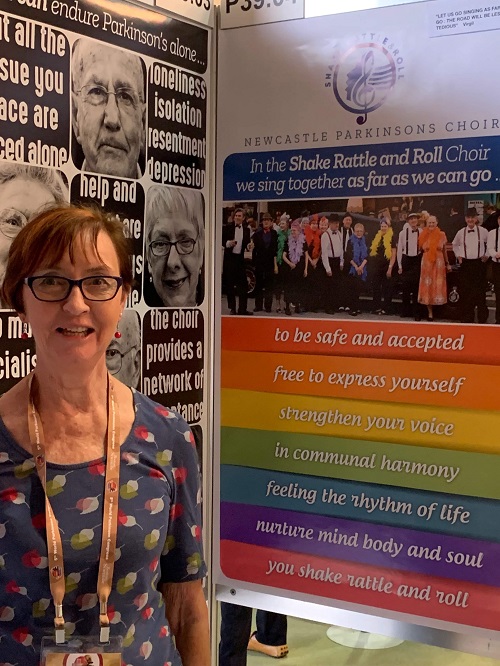
Sandra at the World Parkinson’s Congress 2019
“I’m trying to muster up others to go with me to Barcelona. And as soon as it’s safe to travel around New South Wales I will be visiting other Support Groups to interest them in the Congress.”
Sandra has also devoted time to other causes such as teaching English to refugees and says she doesn’t do it for ‘pats on the back’ but because ‘I think it’s what you do if you are able’.
In a busy life which has always involved caring for, helping, and teaching other people while fighting her own battles, Sandra understands that life isn’t always easy. But her advice is not to be a quitter, even if you are having difficult times.
“So many people are having a hard time and it can be easy to feel depressed,” she said. “But I think if you give up, that’s when life becomes unpleasant.”


